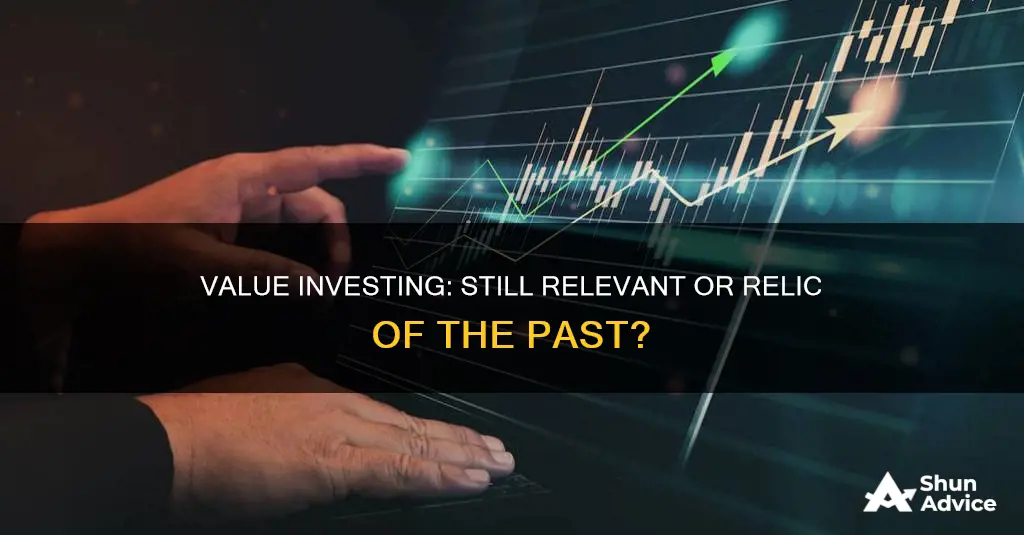
Value investing is a long-term strategy that involves buying stocks that are undervalued by the market and selling them at a profit when their value rises. The approach is based on the idea that markets overreact to news, resulting in stock price movements that do not align with a company's long-term fundamentals. While value investing has faced criticism and has performed poorly during certain periods, such as the pandemic, it has also demonstrated resilience and remains a viable approach for investors. The strategy's effectiveness depends on various factors, including the ability to identify genuinely undervalued stocks and the investor's emotional discipline.
| Characteristics | Values |
|---|---|
| Definition | An investment strategy that involves picking stocks that appear to be trading for less than their intrinsic or book value |
| General Approach | Buying low and selling high |
| Market Performance | Poor during the pandemic |
| Examples | Warren Buffett, Benjamin Graham, David Dodd, Charlie Munger, Christopher Browne, Seth Klarman |
| Metrics | Price-to-book (P/B), price-to-earnings (P/E), free cash flow, debt-to-equity ratio (D/E) |
| Investor Behaviour | Contrarians, don't follow the herd, long-term investors |
| Investor Skills | Financial analysis, accounting, economics, strategy, psychology |
| Investor Mindset | Patient, diligent, analytical, emotionally detached |
| Investor Actions | Research, buy undervalued stocks, hold long-term, sell when price exceeds fair market value |
What You'll Learn

Is value investing still relevant?
Value investing is a strategy where investors pick stocks that appear to be trading for less than their intrinsic or book value. It involves buying investments that are a good value. Value investors believe that the market overreacts to good and bad news, causing stock price movements that do not correspond to a company's long-term fundamentals. By purchasing these stocks at a discount, investors can profit when the value rises.
Value investing has been around for nearly a century and has gained recognition due to its association with prominent investors like Warren Buffett. While it may go through periods of poor performance, such as during the pandemic, it always bounces back.
Value investing is particularly relevant for those who want to survive economic setbacks. By identifying well-financed companies with strong fundamentals, value investors can find stocks that are likely to weather economic storms and thrive when conditions improve.
However, it's important to note that value investing requires a holistic approach. Investors need to look beyond traditional value metrics and combine value investing principles with other investment strategies.
Tips for Successful Value Investing:
- Understand the intrinsic value of a stock: Look for stocks trading at prices that seem cheap relative to their sales, earnings, and assets.
- Take a broad view: Successful investors often have knowledge of various tools and shortcuts, such as technical analysis, and apply this knowledge to their investing decisions.
- Avoid value traps: Be cautious of stocks with unusually high dividend yields or low price-to-earnings ratios, as these may be value traps rather than true bargains.
- Be patient: Value investing can take time, and it's important to hold onto investments even during periods of price stagnation.
- Control your emotions: Value investing requires discipline and a long-term perspective. Don't give in to the herd mentality of buying when prices rise and selling when they drop.
In conclusion, value investing remains relevant, especially for those seeking a long-term strategy to navigate economic setbacks. However, investors should adopt a holistic approach, combining value investing with other strategies, and focus on identifying well-financed companies with strong fundamentals.
Understanding India's Investment-Grade Rating
You may want to see also

What is value investing?
Value investing is an investment strategy that involves buying stocks that are undervalued, or trading for less than their intrinsic or book value. The basic idea is that if you know the true value of something, you can save a lot of money when you buy it.
For example, if you buy a TV on sale, you're getting the same TV for less money. Similarly, the price of a company's stock can fluctuate daily, regardless of its true value. So, on some days, a stock's price may be far higher than its value, and on other days, it might be far lower.
Value investors actively seek out these undervalued stocks and buy them at a discount, hoping to profit when the price rises to match or surpass the actual value. This strategy is based on financial analysis and a long-term outlook, rather than emotional or impulsive buying and selling.
How to Identify Undervalued Stocks
There are several metrics that value investors use to identify undervalued stocks:
- Price-to-book (P/B) ratio: This measures the value of a company's assets compared to its stock price. If the price is lower than the value of the assets, the stock may be undervalued.
- Price-to-earnings (P/E) ratio: This metric looks at a company's track record for earnings to determine if the stock price is reflecting all the earnings or if it's undervalued.
- Free cash flow: This is the cash a company has left after expenses, including operating expenses and capital expenditures. A company with positive free cash flow can invest in its future, pay off debt, pay dividends, etc.
Benefits of Value Investing
Value investing is a medium-to-low-risk strategy that can lead to substantial profits when done right. It requires research, patience, and a long-term perspective. By focusing on the intrinsic value of a stock rather than short-term price fluctuations, value investors can make more informed and rational investment decisions.
Additionally, value investing can help investors survive economic setbacks. By investing in well-financed companies with strong fundamentals and a history of earnings, investors can identify businesses likely to weather economic storms and thrive in the long run.
Saving and Investing: Economy's Growth Engine
You may want to see also

Why would a stock be undervalued?
A stock may be undervalued due to various factors, including market fluctuations, investor reactions to recent news, or general market undervaluation. The concept of value investing hinges on the idea that prices can diverge significantly from actual value in the short run due to human irrationalities and professional conflicts of interest.
An undervalued stock is one that is priced lower than its intrinsic or true value. This intrinsic value is the present value of the free cash flows expected to be made by the company. To identify undervalued stocks, investors can look at underlying company financial statements and analyse fundamentals such as cash flow, return on assets, profit generation, and capital management.
Undervalued stocks present an opportunity for investors to buy shares at a lower price and benefit from the eventual rise in prices. However, it is important to remember that value investing is not foolproof. There is no guarantee that a stock that appears undervalued will appreciate, and determining a stock's intrinsic value is challenging.
When considering investing in undervalued stocks, it is crucial to conduct thorough research and due diligence. This includes analysing the company's financial health, industry position, and growth prospects, as well as understanding broader market trends and the specific industry's health. Identifying the reason for the undervaluation is also essential – is it due to temporary issues or deeper structural problems?
In summary, undervalued stocks can be a lucrative investment opportunity, but it requires a keen eye, a disciplined approach, and a long-term perspective.
Beating Inflation: India's Investment Strategies
You may want to see also

How do you do value investing?
Value investing is a strategy where investors seek out stocks that are trading for less than their intrinsic value, with the goal of realising capital gains when their true worth is recognised. Here are the steps and principles to follow when value investing:
Step 1: Identify Undervalued Stocks
The first step in value investing is to identify stocks that are trading for less than their intrinsic or book value. This involves analysing a company's business model and estimating its intrinsic value. Investors use various metrics, such as discounted cash flow analysis and peer comparisons on key ratios like price-to-earnings (P/E ratio), price-to-sales (P/S ratio), and price-to-book value (P/B ratio), to determine a company's intrinsic value.
Step 2: Assess the Company's Business Model and Financials
When assessing a company's business model, value investors look for proven business models with a long track record of profitability during strong and weak economic periods. They also look for steady growth in revenue and cash flow, experienced leadership, a strong competitive advantage, and a commitment to returning value to shareholders.
Additionally, value investors analyse a company's financial statements, including its income statement, balance sheet, and statement of cash flows, to evaluate its financial performance, revenue, earnings, cash flow, profit, and fundamental factors.
Step 3: Compare Intrinsic Value to Market Price
After determining a company's intrinsic value, value investors compare it to the current market price of the stock. If the intrinsic value is significantly higher than the market price, the stock is considered undervalued and may be a good investment opportunity.
Step 4: Consider the Margin of Safety
Value investors use the concept of a "margin of safety" to minimise risk. The margin of safety is the difference between the company's fair value per share and its current stock price, expressed as a percentage. A higher margin of safety implies lower downside risk and higher upside potential.
Step 5: Make a Long-Term Investment
Value investing is typically a long-term strategy. Investors who employ this strategy aim to hold their investments for years or even decades, waiting for the market to recognise the true value of the stocks they have identified. This requires patience and a long-term outlook, as it may take time for the market to correct and for gains to materialise.
Principles of Value Investing:
- Focus on the Business, Not the Stock Price: Value investors emphasise researching and analysing the fundamentals of the company rather than following market trends or stock prices.
- Understand the Business: It is important to invest in companies you understand to make educated guesses about their future earnings.
- Find Well-Managed Companies: Look for companies with honest and competent management that focuses on long-term shareholder value creation.
- Don't Over-Diversify: While diversification is important, over-diversification can make it difficult to properly track your investments. It is better to focus on a few carefully selected stocks.
- Ignore Short-Term Market Noise: Value investors ignore short-term market fluctuations and focus on the long-term fundamentals of the business.
Value investing requires patience and a disciplined approach. It involves thorough research and analysis to identify undervalued stocks and a long-term perspective to realise gains.
Crafting a Compelling Private Equity Investment Case
You may want to see also

Is value investing right for you?
Value investing is a long-term strategy that can be highly rewarding but is not suitable for everyone. It requires a great deal of patience, discipline, and the ability to detach yourself from your investments emotionally.
Understanding Value Investing
Value investing is an investment strategy that involves buying stocks that appear to be trading for less than their intrinsic or book value. The basic concept is that if you know the true value of something, you can save a lot of money when you buy it. Value investors believe that the market overreacts to good and bad news, resulting in stock price movements that do not correspond to a company's long-term fundamentals.
Pros of Value Investing
Value investing has been a successful strategy for many investors, including the famous Warren Buffett. It can be a good way to make substantial profits while taking on a medium-to-low level of risk.
Cons of Value Investing
Value investing requires a great deal of research and analysis, and even then, there is no guarantee of success. It can be challenging to accurately determine the intrinsic value of a company, and even if you do, the stock price may not rise as expected.
Value investing requires a long-term commitment and the ability to resist the herd mentality. You must be able to ignore short-term fluctuations in stock prices and focus on the long-term potential. It is also important to be able to detach yourself emotionally from your investments, as fear and excitement can lead to impulsive decisions that may hurt your returns.
In summary, value investing can be a successful strategy, but it requires a great deal of knowledge, discipline, and emotional detachment. If you are willing to put in the time and effort to research and analyze your investments and can resist the temptation to follow the crowd, then value investing may be a good fit for you.
Portfolio Strategies for Exponential Growth: Secrets to Success
You may want to see also
Frequently asked questions
Value investing is a strategy that involves buying stocks that are undervalued or trading for less than their intrinsic or book value. The idea is that eventually, the stock price will correct itself and rise to its true value, allowing investors to make a profit by selling at a higher price.
Value investing has been a successful strategy for many investors over long periods. It allows investors to buy stocks at a discount and profit from market overreactions. By focusing on the intrinsic value of a stock rather than short-term price fluctuations, value investors can identify well-financed companies with strong long-term potential that are likely to survive economic setbacks.
Value investing requires diligent research and a long-term perspective. Investors must analyse financial statements, evaluate a company's fundamentals, and identify undervalued stocks. It also involves understanding human nature and controlling emotions to avoid herd mentality and make logical investment decisions.
Value investing requires patience as it can take months or years to see profits. It also demands a broad perspective, combining financial analysis with an understanding of human nature and market psychology. Additionally, there is a risk of losing money if the stock does not perform as expected or if investors give in to fear and sell too early.







